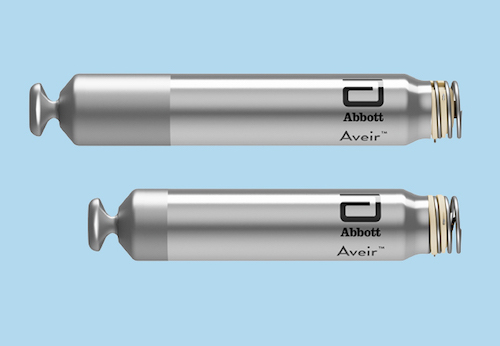
July 5, 2023 – Abbott announced that the FDA has approved the AVEIR™ dual chamber leadless pacemaker system, the world’s first dual chamber leadless pacing system that treats people with abnormal or slow heart rhythms. With more than 80% of people who need a pacemaker requiring pacing in two chambers of the heart (both the right atrium and right ventricle), the approval significantly increases access to leadless pacing for millions of people across the U.S.
Through Abbott’s proprietary i2i communication technology, AVEIR DR devices provide synchronized or coordinated cardiac pacing between two leadless pacemakers based on the person’s clinical needs. The i2i technology utilizes high-frequency pulses to relay messages via the naturally conductive characteristics of the body’s blood between each leadless pacemaker. To support dual chamber therapy, each implant communicates beat-to-beat with a paired, co-implanted device. This conductive communication is critical, because it uses far less battery current than inductive, radio frequency or Bluetooth communication which are other alternatives used in implantable medical devices or traditional pacemakers.
Roughly one-tenth the size of a traditional pacemaker, the AVEIR DR leadless pacing system is made up of two devices – the previously-approved AVEIR VR single chamber device, which paces the right ventricle, and the now-approved AVEIR AR single chamber device, which paces the right atrium. The AVEIR DR system incorporates Abbott’s novel i2i technology, which solves a significant engineering challenge by offering beat-to-beat communication between the two leadless pacemakers.
The FDA approval of the AVEIR DR dual chamber leadless pacemaker system comes on the heels of recent late-breaking clinical data published in The New England Journal of Medicine showing that AVEIR DR system met its three prespecified primary endpoints for safety and efficacy. Results from the AVEIR DR i2i Investigational Device Exemption (IDE) study through three-months post-implant showed a 98.3% implant success rate for physicians and more than 97% of people had a successful atrio-ventricular synchrony, so that the upper and lower chamber were beating normally, despite different types of underlying slow heart rhythms.
